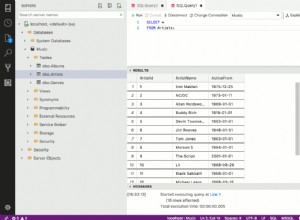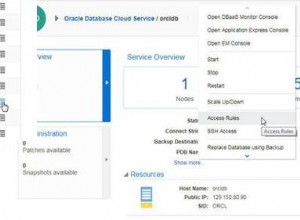W tym artykule pokażemy, jak zainstalować PostgreSQL 12 na Ubuntu 20.04/18.04/16.04. PostgreSQL to system baz danych o otwartym kodzie źródłowym, który jest potężny jak inne relacyjne systemy baz danych.
Możesz wyświetlić stronę wydania postgreSQL 12.
Kroki instalacji PostgreSQL 12 na Ubuntu
Krok 1:Zaktualizuj system Ubuntu
Zawsze zaleca się aktualizację systemu przed instalacją PostgreSQL.
sudo apt update
Krok 2:Zainstaluj wymagany pakiet
sudo apt -y install vim bash-completion wget
Jeśli pakiet jest już zainstalowany, otrzymasz poniżej wynik, możesz go zignorować.
Przykładowe wyjście:
root@PostgreSQL:~# sudo apt -y install vim bash-completion wget Reading package lists... Done Building dependency tree Reading state information... Done bash-completion is already the newest version (1:2.11-2ubuntu1). vim is already the newest version (2:8.2.0716-3ubuntu2). wget is already the newest version (1.20.3-1ubuntu1). wget set to manually installed. The following package was automatically installed and is no longer required: virtualbox-guest-utils Use 'sudo apt autoremove' to remove it. 0 upgraded, 0 newly installed, 0 to remove and 212 not upgraded. root@PostgreSQL:~#
Krok 3:Dodaj repozytorium PostgreSQL 12
wget --quiet -O - https://www.postgresql.org/media/keys/ACCC4CF8.asc | sudo apt-key add -
echo "deb https://apt.postgresql.org/pub/repos/apt/ `lsb_release -cs`-pgdg main" |sudo tee /etc/apt/sources.list.d/pgdg.list
Krok 4:Zainstaluj PostgreSQL 12 na Ubuntu
sudo apt update sudo apt -y install postgresql-12 postgresql-client-12
Przykładowe wyjście:
root@PostgreSQL:~# sudo apt -y install postgresql-12 postgresql-client-12 Reading package lists... Done Building dependency tree Reading state information... Done The following package was automatically installed and is no longer required: virtualbox-guest-utils Use 'sudo apt autoremove' to remove it. The following additional packages will be installed: libcommon-sense-perl libjson-perl libjson-xs-perl libpq5 libtypes-serialiser-perl pgdg-keyring postgresql-client-common postgresql-common sysstat Suggested packages: postgresql-doc-12 isag The following NEW packages will be installed: libcommon-sense-perl libjson-perl libjson-xs-perl libpq5 libtypes-serialiser-perl pgdg-keyring postgresql-12 postgresql-client-12 postgresql-client-common postgresql-common sysstat 0 upgraded, 11 newly installed, 0 to remove and 212 not upgraded. Need to get 17.5 MB of archives. After this operation, 59.4 MB of additional disk space will be used. Get:1 https://apt.postgresql.org/pub/repos/apt groovy-pgdg/main amd64 libpq5 amd64 13.3-1.pgdg20.10+1 [177 kB] Get:2 https://us.archive.ubuntu.com/ubuntu groovy/main amd64 libcommon-sense-perl amd64 3.75-1build2 [20.5 kB] Get:3 https://us.archive.ubuntu.com/ubuntu groovy/main amd64 libjson-perl all 4.02000-2 [80.9 kB] Get:4 https://apt.postgresql.org/pub/repos/apt groovy-pgdg/main amd64 pgdg-keyring all 2018.2 [10.7 kB] Get:5 https://apt.postgresql.org/pub/repos/apt groovy-pgdg/main amd64 postgresql-client-common all 226.pgdg20.10+1 [90.6 kB] Get:6 https://us.archive.ubuntu.com/ubuntu groovy/main amd64 libtypes-serialiser-perl all 1.0-1 [12.1 kB] Get:7 https://us.archive.ubuntu.com/ubuntu groovy/main amd64 libjson-xs-perl amd64 4.020-1build1 [83.7 kB] Get:8 https://apt.postgresql.org/pub/repos/apt groovy-pgdg/main amd64 postgresql-client-12 amd64 12.7-1.pgdg20.10+1 [1,429 kB] Get:9 https://us.archive.ubuntu.com/ubuntu groovy/main amd64 sysstat amd64 12.4.0-1 [471 kB] Get:10 https://apt.postgresql.org/pub/repos/apt groovy-pgdg/main amd64 postgresql-common all 226.pgdg20.10+1 [246 kB] Get:11 https://apt.postgresql.org/pub/repos/apt groovy-pgdg/main amd64 postgresql-12 amd64 12.7-1.pgdg20.10+1 [14.9 MB] Fetched 17.5 MB in 15s (1,141 kB/s) Preconfiguring packages ... Selecting previously unselected package libcommon-sense-perl. (Reading database ... 192977 files and directories currently installed.) Preparing to unpack .../00-libcommon-sense-perl_3.75-1build2_amd64.deb ... Unpacking libcommon-sense-perl (3.75-1build2) ... Selecting previously unselected package libjson-perl. Preparing to unpack .../01-libjson-perl_4.02000-2_all.deb ... Unpacking libjson-perl (4.02000-2) ... Selecting previously unselected package libtypes-serialiser-perl. Preparing to unpack .../02-libtypes-serialiser-perl_1.0-1_all.deb ... Unpacking libtypes-serialiser-perl (1.0-1) ... Selecting previously unselected package libjson-xs-perl. Preparing to unpack .../03-libjson-xs-perl_4.020-1build1_amd64.deb ... Unpacking libjson-xs-perl (4.020-1build1) ... Selecting previously unselected package libpq5:amd64. Preparing to unpack .../04-libpq5_13.3-1.pgdg20.10+1_amd64.deb ... Unpacking libpq5:amd64 (13.3-1.pgdg20.10+1) ... Selecting previously unselected package pgdg-keyring. Preparing to unpack .../05-pgdg-keyring_2018.2_all.deb ... Unpacking pgdg-keyring (2018.2) ... Selecting previously unselected package postgresql-client-common. Preparing to unpack .../06-postgresql-client-common_226.pgdg20.10+1_all.deb ... Unpacking postgresql-client-common (226.pgdg20.10+1) ... Selecting previously unselected package postgresql-client-12. Preparing to unpack .../07-postgresql-client-12_12.7-1.pgdg20.10+1_amd64.deb .. . Unpacking postgresql-client-12 (12.7-1.pgdg20.10+1) ... Selecting previously unselected package postgresql-common. Preparing to unpack .../08-postgresql-common_226.pgdg20.10+1_all.deb ... Adding 'diversion of /usr/bin/pg_config to /usr/bin/pg_config.libpq-dev by post gresql-common' Unpacking postgresql-common (226.pgdg20.10+1) ... Selecting previously unselected package postgresql-12. Preparing to unpack .../09-postgresql-12_12.7-1.pgdg20.10+1_amd64.deb ... Unpacking postgresql-12 (12.7-1.pgdg20.10+1) ... Selecting previously unselected package sysstat. Preparing to unpack .../10-sysstat_12.4.0-1_amd64.deb ... Unpacking sysstat (12.4.0-1) ... Setting up pgdg-keyring (2018.2) ... Removing apt.postgresql.org key from trusted.gpg: OK Setting up libpq5:amd64 (13.3-1.pgdg20.10+1) ... Setting up libcommon-sense-perl (3.75-1build2) ... Setting up libtypes-serialiser-perl (1.0-1) ... Setting up libjson-perl (4.02000-2) ... Setting up sysstat (12.4.0-1) ... Creating config file /etc/default/sysstat with new version update-alternatives: using /usr/bin/sar.sysstat to provide /usr/bin/sar (sar) i n auto mode Created symlink /etc/systemd/system/sysstat.service.wants/sysstat-collect.timer → /lib/systemd/system/sysstat-collect.timer. Created symlink /etc/systemd/system/sysstat.service.wants/sysstat-summary.timer → /lib/systemd/system/sysstat-summary.timer. Created symlink /etc/systemd/system/multi-user.target.wants/sysstat.service → / lib/systemd/system/sysstat.service. Setting up postgresql-client-common (226.pgdg20.10+1) ... Setting up libjson-xs-perl (4.020-1build1) ... Setting up postgresql-client-12 (12.7-1.pgdg20.10+1) ... update-alternatives: using /usr/share/postgresql/12/man/man1/psql.1.gz to provi de /usr/share/man/man1/psql.1.gz (psql.1.gz) in auto mode Setting up postgresql-common (226.pgdg20.10+1) ... Adding user postgres to group ssl-cert Creating config file /etc/postgresql-common/createcluster.conf with new version Building PostgreSQL dictionaries from installed myspell/hunspell packages... en_us Removing obsolete dictionary files: Created symlink /etc/systemd/system/multi-user.target.wants/postgresql.service → /lib/systemd/system/postgresql.service. Setting up postgresql-12 (12.7-1.pgdg20.10+1) ... Creating new PostgreSQL cluster 12/main ... /usr/lib/postgresql/12/bin/initdb -D /var/lib/postgresql/12/main --auth-local p eer --auth-host md5 The files belonging to this database system will be owned by user "postgres". This user must also own the server process. The database cluster will be initialized with locale "en_US.UTF-8". The default database encoding has accordingly been set to "UTF8". The default text search configuration will be set to "english". Data page checksums are disabled. fixing permissions on existing directory /var/lib/postgresql/12/main ... ok creating subdirectories ... ok selecting dynamic shared memory implementation ... posix selecting default max_connections ... 100 selecting default shared_buffers ... 128MB selecting default time zone ... America/New_York creating configuration files ... ok running bootstrap script ... ok performing post-bootstrap initialization ... ok syncing data to disk ... ok Success. You can now start the database server using: pg_ctlcluster 12 main start Ver Cluster Port Status Owner Data directory Log file 12 main 5432 down postgres /var/lib/postgresql/12/main /var/log/postgresq l/postgresql-12-main.log update-alternatives: using /usr/share/postgresql/12/man/man1/postmaster.1.gz to provide /usr/share/man/man1/postmaster.1.gz (postmaster.1.gz) in auto mode Processing triggers for systemd (246.6-1ubuntu1) ... Processing triggers for man-db (2.9.3-2) ... Processing triggers for libc-bin (2.32-0ubuntu3) ... root@PostgreSQL:~#
Krok 5:Sprawdź stan usługi PostgreSQL
systemctl status postgresql.service
Przykładowe wyjście:
root@PostgreSQL:~# systemctl status postgresql.service ● postgresql.service - PostgreSQL RDBMS Loaded: loaded (/lib/systemd/system/postgresql.service; enabled; vendor p> Active: active (exited) since Sun 2021-05-16 09:17:56 EDT; 1min 56s ago Main PID: 10932 (code=exited, status=0/SUCCESS) Tasks: 0 (limit: 4648) Memory: 0B CGroup: /system.slice/postgresql.service May 16 09:17:56 PostgreSQL systemd[1]: Starting PostgreSQL RDBMS... May 16 09:17:56 PostgreSQL systemd[1]: Finished PostgreSQL RDBMS. root@PostgreSQL:~#
Krok 6:Połącz PostgreSQL
sudo su - postgres
Krok 7:Zresetuj hasło PostgreSQL
Zalecane jest zresetowanie hasła do silnego hasła
psql -c "alter user postgres with password 'StrongAdminP@ssw0rd'"
Przykładowe wyjście:
root@PostgreSQL:~# sudo su - postgres postgres@PostgreSQL:~$ postgres@PostgreSQL:~$ psql -c "alter user postgres with password 'StrongAdminP@ssw0rd'" ALTER ROLE postgres@PostgreSQL:~$
Krok 8:Utwórz bazę danych PostgreSQL
$ psql $ CREATE DATABASE firsttestdb; $ CREATE USER testuser1 WITH ENCRYPTED PASSWORD 'MyDBP@ss0rd'; $ GRANT ALL PRIVILEGES ON DATABASE firsttestdb to testuser1;
Wymień bazę danych PostgreSQL:
$\l
Jak połączyć się z bazą danych PostgreSQL:
\c firsttestdb
Przykładowe wyjście:
postgres=# \c firsttestdb You are now connected to database "firsttestdb" as user "postgres". firsttestdb=#
Teraz zobaczymy, jak zezwolić na zdalne połączenia z bazą danych PostgreSQL.
Krok 9:Zezwól na zdalne połączenie z bazą danych PostgreSQL
sudo nano /etc/postgresql/12/main/postgresql.conf
Odkomentuj wiersz „listen_addresses =„*” „
Zapisz plik i uruchom ponownie usługę PostgreSQL
sudo systemctl restart postgresql
Krok 10:Sprawdź adres odsłuchu
netstat -tunelp | grep 5432
Przykładowe wyjście:
root@PostgreSQL:~# netstat -antple | grep 5432 tcp 0 0 0.0.0.0:5432 0.0.0.0:* LISTEN 135 253939 13850/postgres tcp6 0 0 :::5432 :::* LISTEN 135 253940 13850/postgres root@PostgreSQL:~#
Koniec artykułu, widzieliśmy, jak zainstalować PostgreSQL 12 na Ubuntu 20.04/18.04/16.04.




